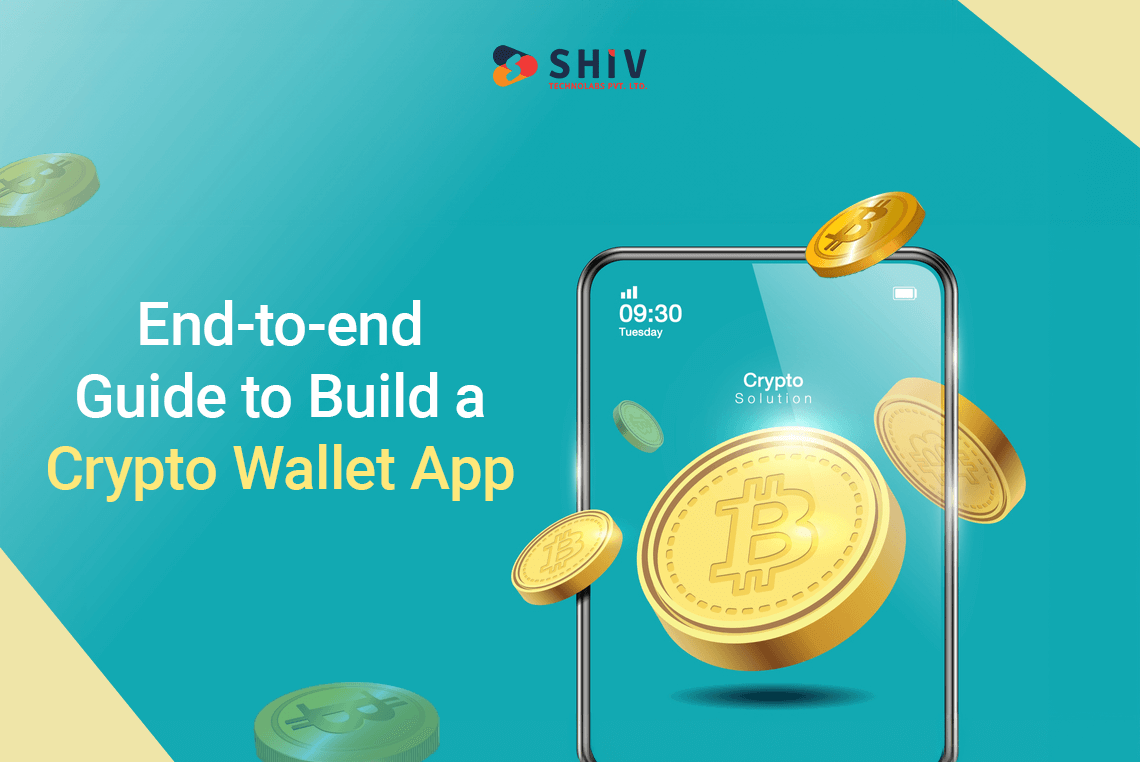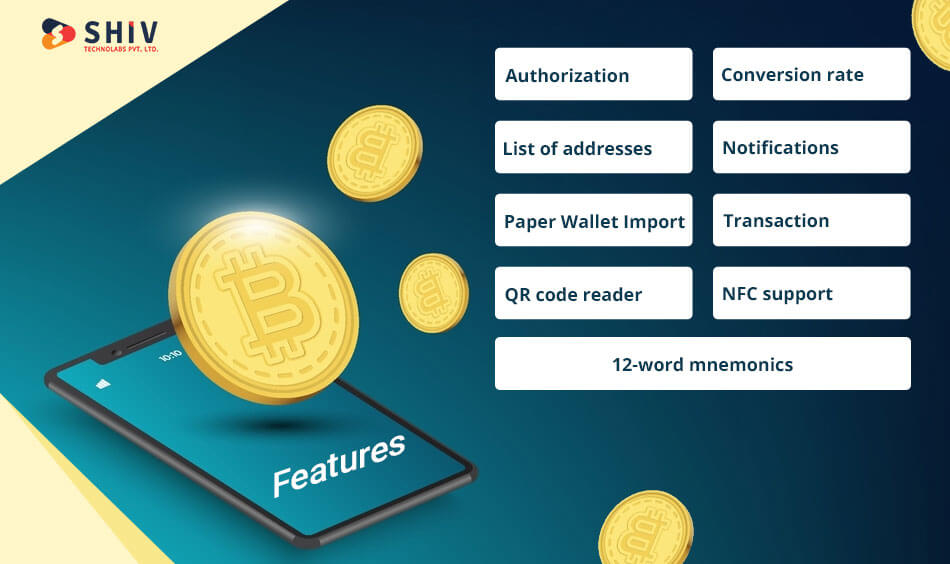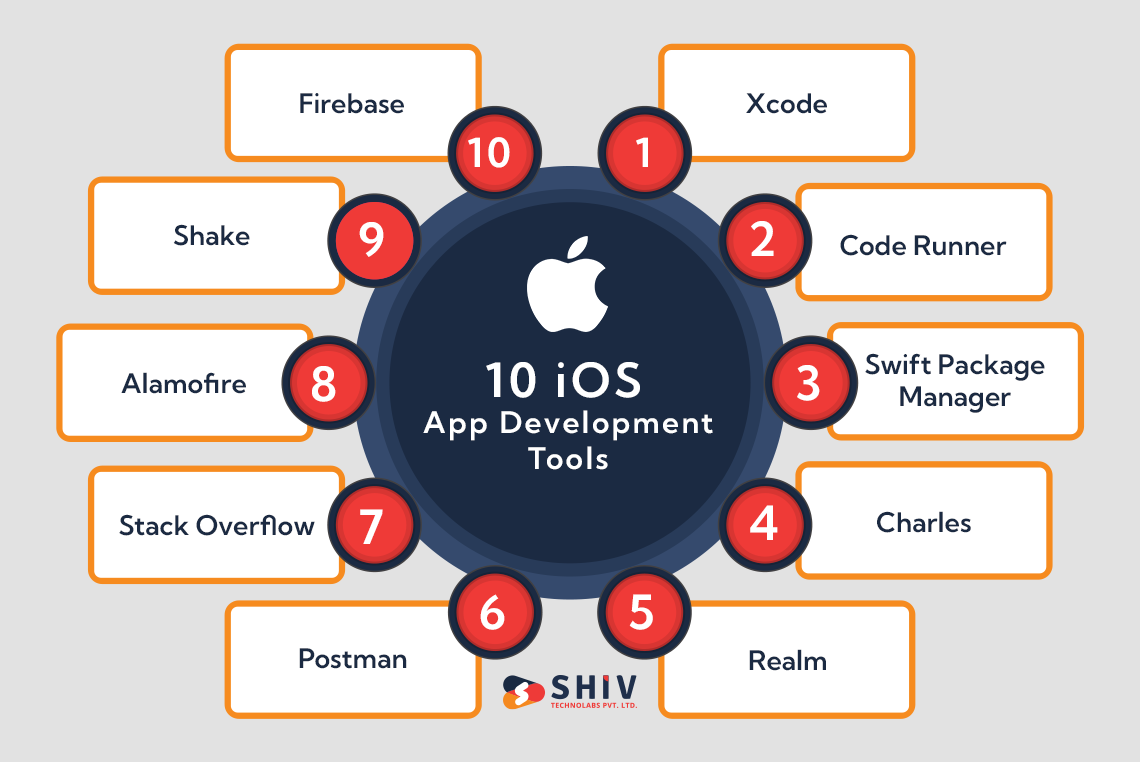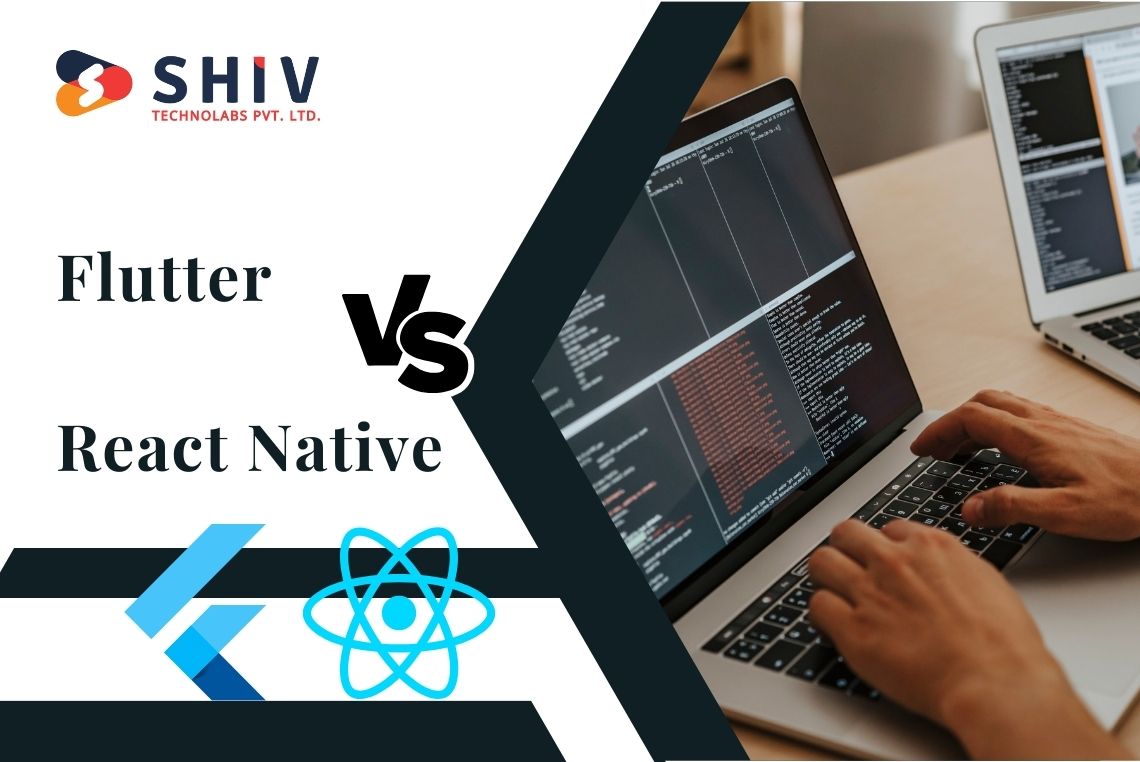A lot is happening in the world of modern technological startups trying to bridge the gap between the virtual and non-virtual aspects of life through blockchain technology, which is disrupting our world. Mobile apps have decentralized technologies that enable the incorporation of digital payment options, including cryptocurrencies. These can be customized for business purposes or used to transact on its behalf.
How can you create a crypto wallet with some functions that will be appealing to people? In this POST, we will tell you how it is possible to make a cryptocurrency wallet app and how much money you need to pay for such a product.
What is a Cryptocurrency Wallet?
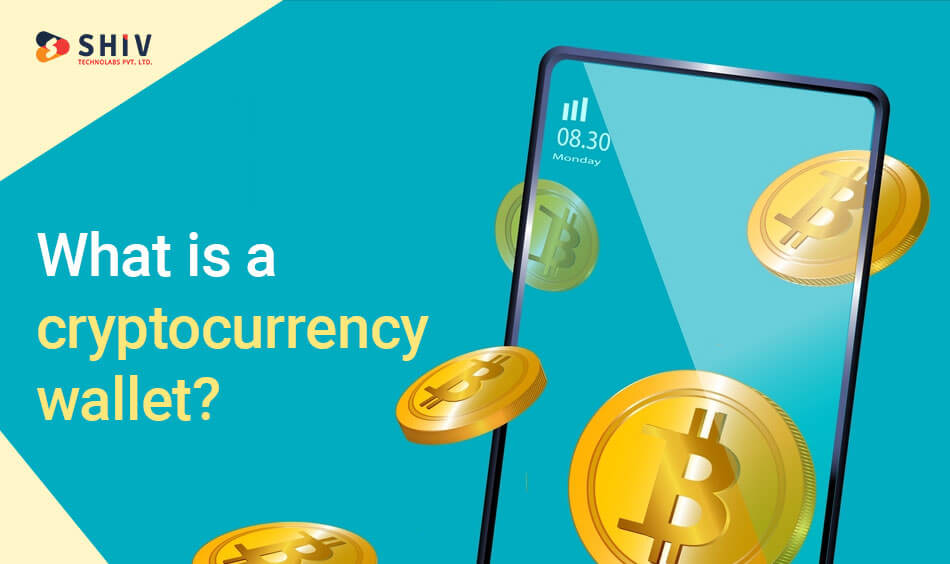
A specific software program is required to use cryptocurrency. This kind of program is called a “digital wallet,” it relates to the blockchain and assists in operations.
These crypto wallets allow buyers, lenders, or borrowers to record the number of bitcoins or any other cryptocurrency they hold as an investment. They are a form of software that retains clients’ transactions, including coins owned.
Most of them deal with Bitcoin, a widely accepted digital currency, and Ether, also popular in the market. Yet, at this moment, when the altcoin number is increasing, numerous desktop wallets support different cryptocurrencies.
In Bitcoin wallet transactions, asymmetric key cryptography is used. This type of cryptography employs two forms of keys- public key and private key.
The recipient’s address becomes the new owner if someone sends their bitcoins to an address on another wallet; this transfers ownership from one wallet address to another. The transaction is saved as a transaction record on the Bitcoin blockchain, while the relevant wallet balances will be affected.
Types of Crypto Wallets
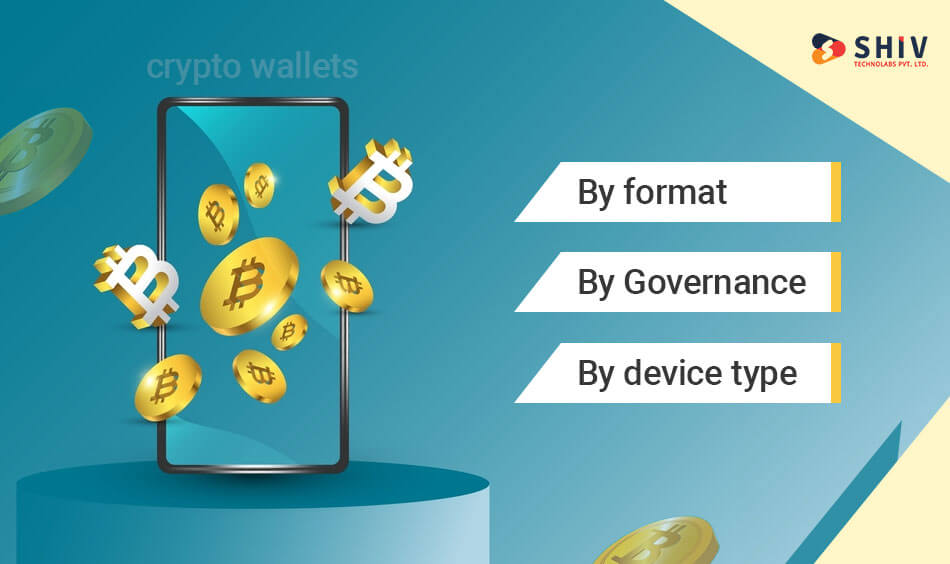
The standards determining the selection of a wallet application are its simplicity, security level, number of available cryptocurrencies, and wallet format, with some additional features.
# By Format
Different wallet formats have different ways of working hot (software) and cold (hardware) wallets. Hot wallets include web applications, desktop applications, and mobile apps. Cold wallets come in a physical form; these are special devices that can be connected to a PC.
# By Governance
There is also another category based on how the user manages their public and private keys – by governance; cryptocurrency wallets can be divided into two groups: custodial and non-custodial.
Custodial services like an exchange store public and private keys on servers owned by the company. Besides, a developer is also responsible for backing up data. This category includes crypto exchange wallets as well as some software wallets.
Non-custodial wallets allow users to keep their keys on their own devices. When opening such a wallet, the user writes down a phrase for recovery, which would be necessary in case one has lost their keys. Centralized agencies providing custodial services are less secure than non-custodial options.
# By Device Type
Non-custodial wallets are the most popular crypto wallets and can be classified based on the type of device used to access them.
- Desktop wallets:- Among these types, desktop wallets are the most widely used by users. It is an application that should be installed on your computer or laptop. All data regarding cryptocurrencies and private keys will be stored in the user’s computer memory, so additional protection measures should be taken, like using 2FA and a security program, as experts suggest. The desktop wallet is convenient among other software wallets because it is highly protected. Hence, it is widely employed for staking purposes too
- Mobile wallets:- Mobile wallets are desktop wallets alternatives that come with extra features. Installing a mobile cryptocurrency wallet application on a mobile device is common. These wallets are perfect for daily transactions and purchases since they offer quick asset access. Experts advise securing the mobile crypto wallet using a powerful password and keeping backup copies of the login data file.
- Web wallets:- Web wallets can be used with an ordinary browser without installing any software. This storage option needs to be considered more secure. Users must consider securing their web wallets to prevent money from being stolen. Two-factor authentication and anti-phishing encryption can be employed.
- Paper wallets:- Paper wallets are also cold storage alternatives, whereby the paper contains QR codes of keys for the wallet. Printed data can be scanned when performing transfers. Thus, one’s transactions get completed easier. Crypto funds kept this way are quite safe because the fraudsters cannot get away with stealing private keys or any other online information.
- Hardware wallets:- Some hardware wallets are like flash drives. This model is considered the most secure of all the ones present today. Hardware wallets create private and public keys by themselves. They are separate devices that cannot be used on the net. People who expect their investment to last forever will find this storing method quite suitable. Large capital holders in cryptocurrency also prefer hardware wallets.
Main Features of Crypto Wallet Applications
# Authorization
At this point, users can either sign up or fill out a form with their keys to log into the Bitcoin wallet. Adding Google 2-step verification at this very first stage is one way to ensure the app security against tampering. By doing 2-step verification, firms can introduce another level of safety that standard non-cryptographic apps normally neglect.
# Conversion Rate
Since Cryptocurrency wallet application allows users to perform money transfers across different modes: among digital currencies, between digital and fiat currencies, and within the same digital currency; it must be kept updated with real-time value of money or rates.
# List of Addresses
This attribute will be aimed at expediting and making the entire transaction more expedient so that users can benefit from a way to control their digital currency transactions, which are frequently done via specific addresses.
# Notifications
For instance, using the push notification function, the cryptocurrency app administrator can notify people about its price, when they successfully or unsuccessfully sold it out or bought it in, add an address, and so on. This feature implies that a user should stay in touch with their account’s every move.
# Paper Wallet Import
In addition to these features, another one is known as paper wallet import. Some mobile wallet apps also have a feature where you can scan a paper Bitcoin wallet using a QR code and then add keys to the app wallet to make payments. This scanned data can then be used to send money or receive payments.
Also Read:- Fitness App Development Steps, Cost & Features
# Transaction
Blockchain is all about changing the future of transactions. The most important part of any cryptocoin wallet app is its transaction function. Thus, users can exchange correspondingly with different types of cryptocurrencies using this application for cryptocurrencies. This module is 100% immutable and swift.
Security can be known to many as an important feature in cryptocurrency wallet apps. Blockchain is the future of mobile application security. As opposed to that, there is a need for blockchain technology in app security.
# QR Code Reader
To help speed up transactions involving crypto-assets, the wallet has an auto-scanning QR code reader.
# NFC Support
NFC support works by transferring assets between devices based on their proximity. This happens at the time when the sender taps on the NFC tag, gets the recipient’s wallet address, and completes the transaction.
# 12-word Mnemonics
This is one of the most important characteristics that makes restoring a wallet possible when either deleted or moved to another device. A mnemonic passphrase is usually attached to private keys so that they can be matched with security features.
After getting an idea of the estimated cost for a cryptocurrency wallet app, we will now guide you on how to build a cryptocurrency wallet for your business. You can get assured ROI with the right strategy by developing a custom mobile wallet.
How to Build a Crypto Wallet App?
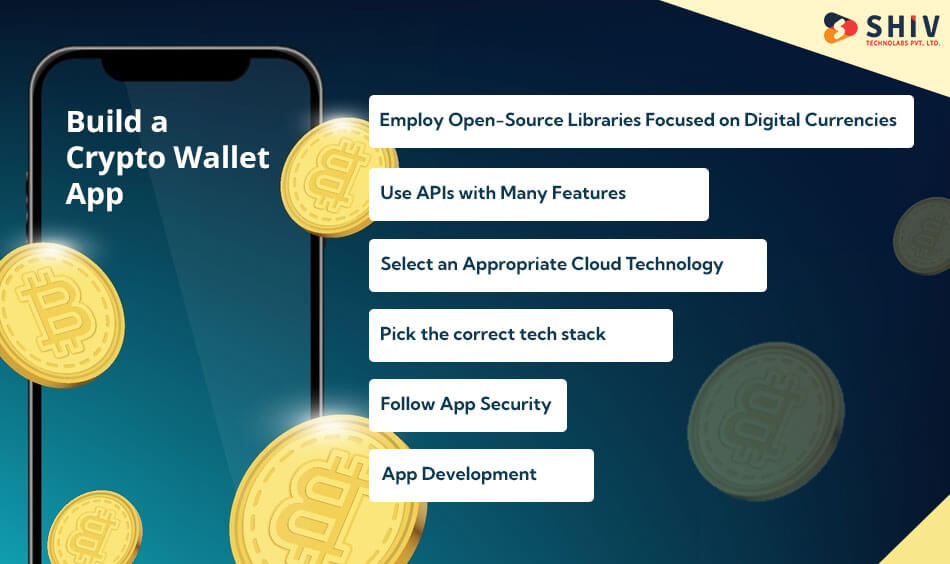
Understanding the basic blockchain technology is necessary to develop a cryptocurrency wallet app. For every cryptocurrency, a blockchain acts as an open bookkeeping system, and it is a distributed p2p database that has defined rules for adding data. Blockchain technology is a means to an end to having more secure and safer transactions.
# Employ Open-Source Libraries Focused on Digital Currencies
Bitcoin SDK or Coinbase SDK are two examples of open-source libraries for Crypto Wallet App Development. It should be easy to find their libraries, for most of these have been made open source by the main cryptocurrencies.
Cross Platform Library Coinbase SDK for Developing a Cryptocurrency Wallet App in Android or iOS is more Common. Besides, it supports other programming languages such as Java, Ruby, Python, etc.
# Use APIs with Many Features
To create a cryptocurrency app, you must use distributed ledger API to facilitate easy wallet synchronization with blockchain technology. Other APIs that can expedite development include SimpleSwap, Coinbase, Factom, and Bitcore.
# Select an Appropriate Cloud Technology
One of the most important thing while one is creating a cryptocurrency application is to choose right cloud technology. As far as web platforms are designed, PaaS (Platform as a Service) should be regarded as one of the surest methods. On the other hand, when making a mobile app, there must be an incorporation of a BaaS (Blockchain as a Service) company. This can be provided by Amazon, Microsoft and Azure.
# Pick The Correct Tech Stack
Next layer on choosing the best technology stack for your crypto wallet app. Keeping your mobile apps up to date with modern technologies can help you stay ahead of your competitors always. React Native App Development is a preferred and well known platform if you would like to develop a mobile app using cross-platform.
# Follow App Security
The Cryptocurrency wallet app must follow safety measures to protect your data. For example, more authentication and an extra layer of security like Face ID or encrypting data will ensure that your wallet app meets all safety guidelines.
# App Development
It is now time to build an app after completing a competitor analysis. Developing the whole application involves settling on a feature list, designing the app, coding, and testing it thoroughly.
Comprehending the Crypto Wallet App Development Cost
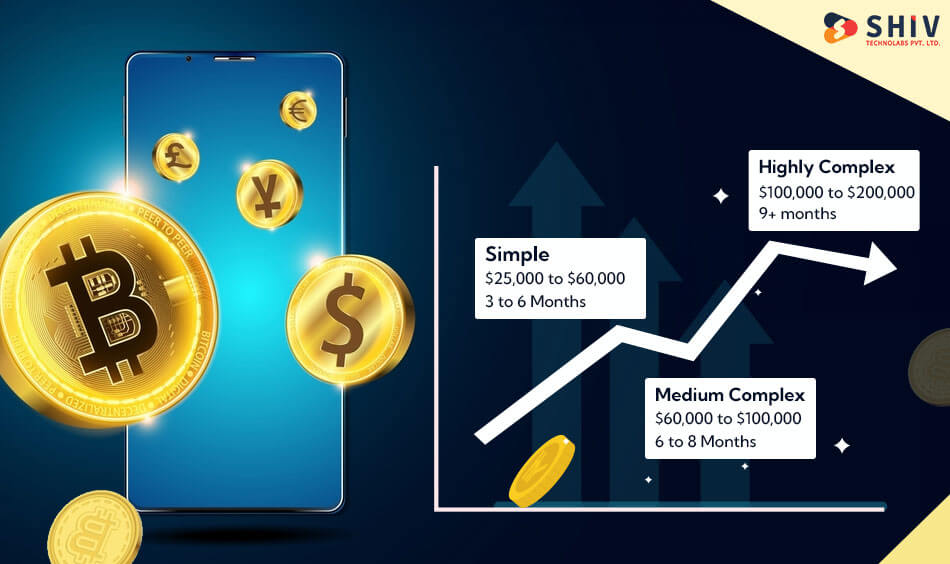
On average, the costs of developing cryptocurrency wallet apps range from $25,000 to $200,000. The complexity level of a blockchain wallet app is also considered in its overall development cost. But, a more complex cryptocurrency app will cost even more.
Such an instance is when you are dealing with simple applications that have basic feature lists going for between $25,000 dollars and $60,000. Conversely, an entire application with an extensive feature list can cost as much as $200,000. Ultimately, it would be wise to select this option even if it means increasing the costs, but it is worthwhile considering their return on investment.
These are some estimated costs depending on app complexity and time required for the development of the blockchain wallet app:
| App Type | Estimated Cost | Estimated Time Frame |
|---|---|---|
| Simple | $25,000 to $60,000 | 3 to 6 Months |
| Medium Complex | $60,000 to $100,000 | 6 to 8 Months |
| Highly Complex | $100,000 to $200,000 | 9+ months |
Now that you have the fail-safe formula for calculating the costs of developing a cryptocurrency mobile wallet app, we can proceed to the reasons contributing to the complexity of the development of cryptocurrency wallet apps and their effects on costs.
Also Read:- Evolving Healthcare: The Role Of Blockchain
The Factors Affecting the Development Cost of Blockchain Wallet
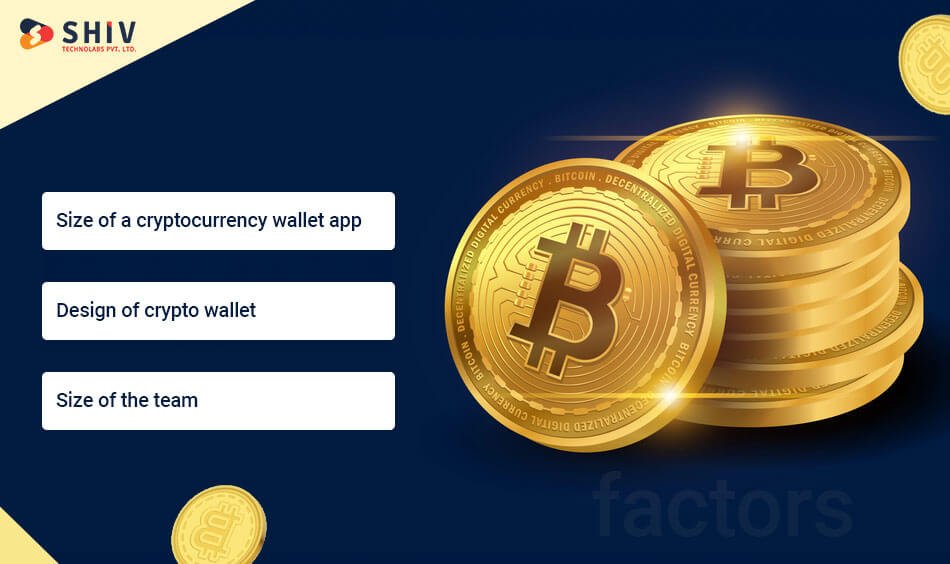
The complexity of a crypto wallet app is determined by multiple factors such as its functionality, technological stack supporting it, design aspects, and so on. While it is impossible to list all possible determinants for your bespoke app requirements, this list attempts to cover most of them in detail.
# Size of a Cryptocurrency Wallet App:
The size of a cryptocurrency wallet app is another factor affecting the total cost of the application. If an app has many integrated features, on the whole, it is larger and, therefore, more expensive to develop. Another way to reduce costs is through MVP development, where only a few core features are added to the first version (MVP). Thus, you can offer your customers a good experience at an affordable price.
MVP will have some of the chief features of an app. After its initial review by the target audience, you can now develop a fully functional crypto wallet app with an extensive list of features.
# Design of Crypto Wallet:
A non-complex and attractive design is crucial in making your crypto wallet successful. The cost of developing a Bitcoin wallet will be influenced depending on requirements, and designing an effective UI/UX will take more, but in the end, it will be beneficial.
Every aspect of your wallet app, such as user interface/user experience design wireframes or anything else, will consume much time to develop as per your requirements. The overall investment will be enormous if you would like something more complicated.
# Size of the Team:
The blockchain wallet cost will depend on the team size of the blockchain app development company you choose. For example, suppose you want to hire a freelancer. In that case, it will be less costly than a big team of project managers, designers, and developers for application development in general.
Selecting the latter will increase the overall cost, but due to their total professionalism, it is money well spent. A committed group of experts could assist you in creating a powerful product that can deliver an exclusive user experience to your client base.
How can Shiv Technolabs Help with Crypto Wallet App Development?
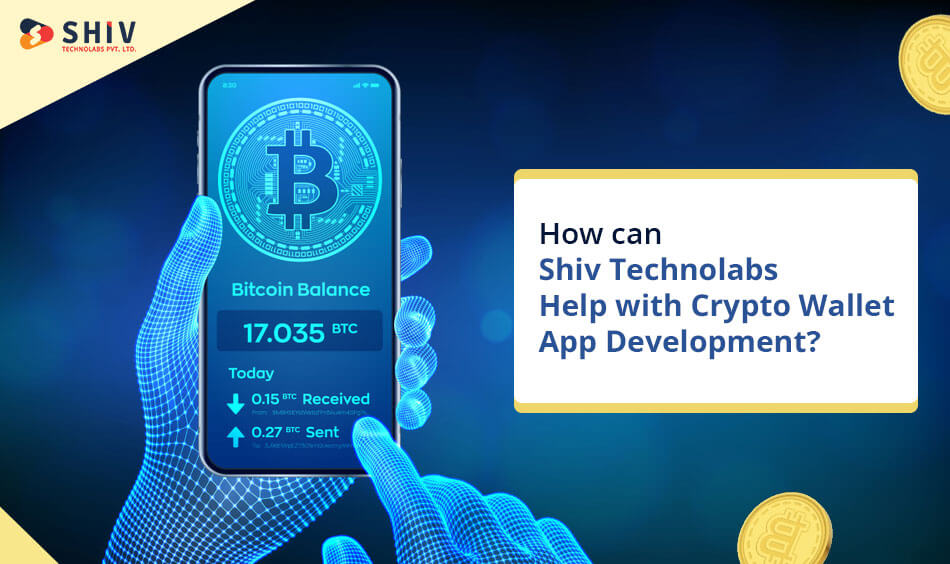
Creating blockchain applications’ price tag relies largely on open-source tools, development teams, analytical verticals, feature integration, and many more.
All these parts give an idea of the range of blockchain application development. Setting up any blockchain application requires a strong project assessment that can determine the costs involved.
Therefore, bringing in an experienced blockchain app development company is cost-effective when streamlining the processes of developing customized cryptocurrency apps. Our vast knowledge of blockchain app development has led powerful organizations to imminent success.
For example, we have a core banking platform based on cryptocurrency that broadened their horizons. We designed a central ledger where transactions were stored and simultaneously made a system that supported FIAT and crypto user fund identity. The app was even able to make cryptocurrency transactions mainstream for the bank. Imagine our joy when we saw the cryptocurrency app recording over 50K+ cryptocurrency transactions.
Talk to us now if you need customized cryptocurrency app development services.
Faqs:
# How long does it take to build a crypto wallet app?
A. A simple crypto wallet app with basic functionality may typically take 3-6 months to develop. However, a highly complex app can consume about 9-12 months in development.
# What does it take to create a cryptocurrency wallet app?
A. The cryptocurrency wallet app development involves many steps. Hence, it would be advisable to have an MVP built by specialized crypto wallet app developers. After receiving initial user feedback, you can shift to a full-blown application packed with bells and whistles.
# How much does it cost to develop a crypto wallet app?
A. The cost of developing an e-money wallet application depends on its complexity. It could range between $25000 and $60000 for simple ones, but this figure could hit up to $200000 for very complicated structures.

Revolutionize Your Digital Presence with Our Mobile & Web Development Service. Trusted Expertise, Innovation, and Success Guaranteed.
